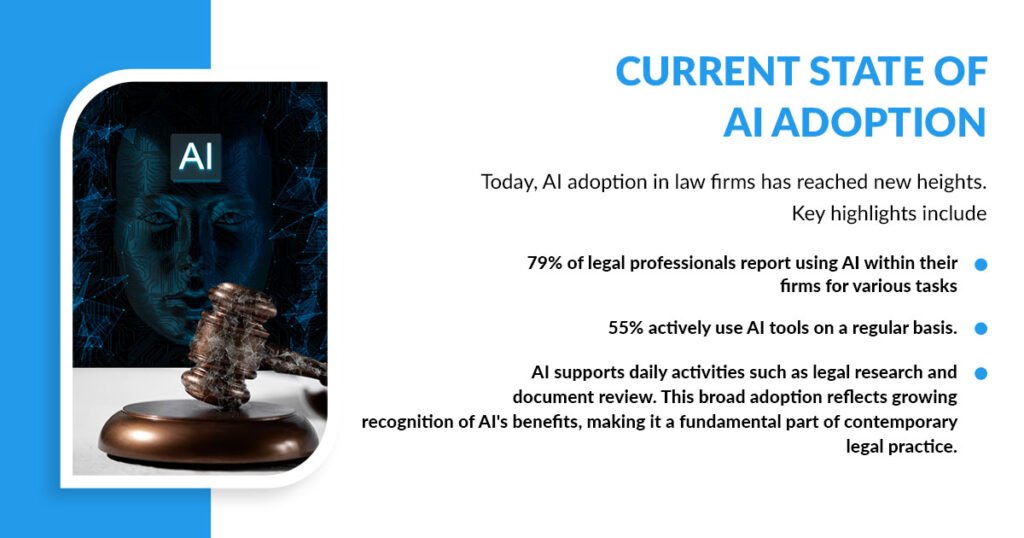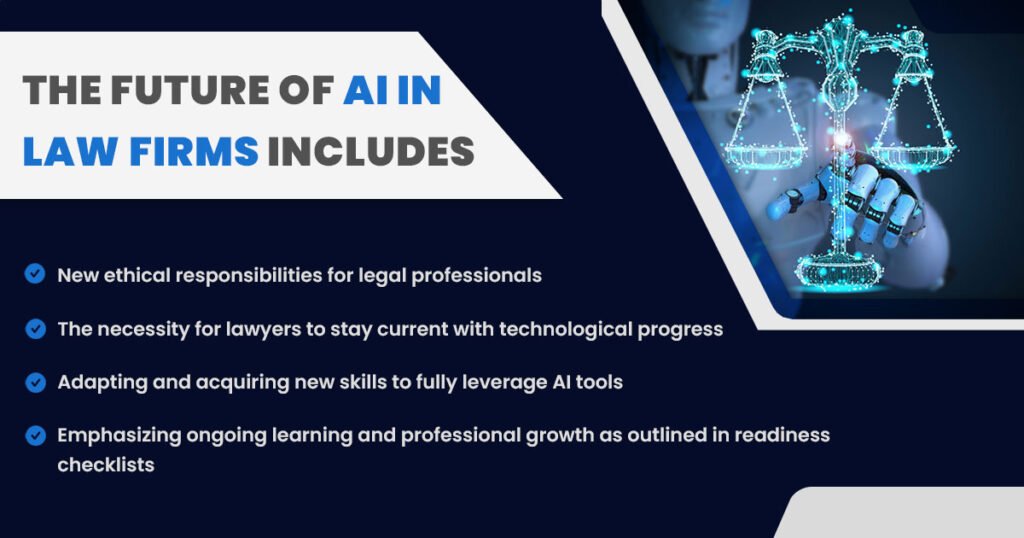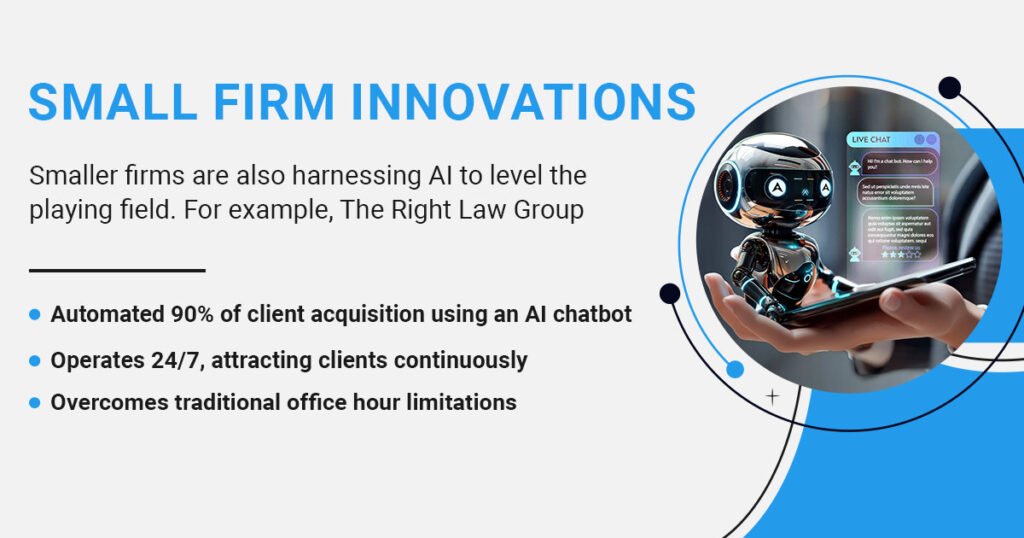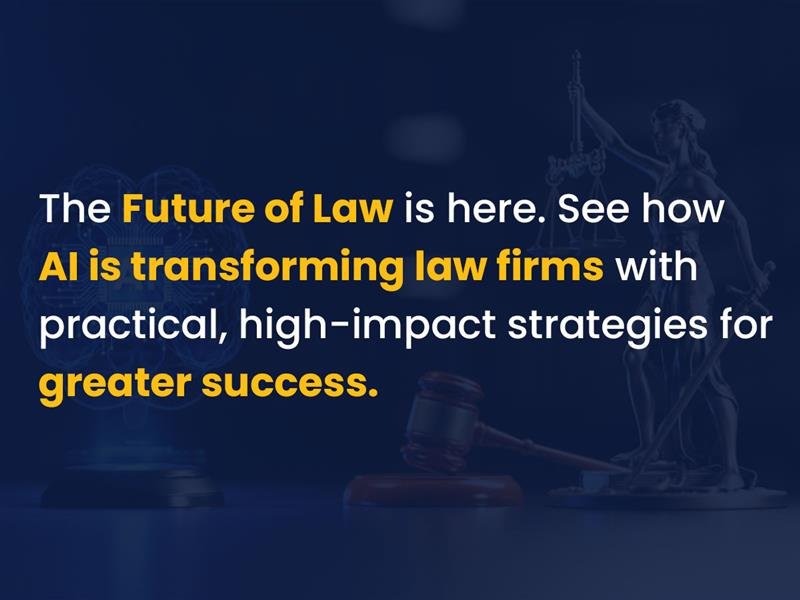AI for legal firms is revolutionizing how lawyers operate, from automating document review to improving client services. At TGC Digital Services Pvt. Ltd., we specialize in helping legal firms harness the power of AI-driven digital marketing to attract more clients and streamline their lead generation. This article explores the key AI tools making an impact and the substantial benefits they offer to legal practices.
Key Takeaways
- AI is becoming an essential part of legal practice, with 79% of legal professionals using it for tasks like legal research and document review, thereby boosting operational efficiency.
- Leading AI tools such as Clio Duo, CoCounsel, and Harvey AI are streamlining legal workflows, enabling lawyers to focus on more strategic, high-value work.
- Despite its advantages, AI in law raises ethical issues including bias and data security, requiring human oversight and the creation of ethical guidelines to ensure responsible usage.
The Evolution of AI in Legal Practice
Artificial intelligence ai is reshaping the legal field in ways unimaginable just a few decades ago. With continuous advancements in lawyer AI emerging almost daily, the legal profession is undergoing a significant transformation. The adoption of AI in legal practice has progressed from a novel idea to a vital element of modern law firms, allowing lawyers to manage increasingly complex tasks with greater speed and precision.
The introduction of AI in the legal profession started with automating routine tasks such as document review and initial legal research. These foundational AI tools paved the way for more advanced applications, which we will discuss in the following sections.
Moving forward, we will examine the early AI tools embraced by law firms and the current landscape of AI adoption in the legal industry.
Early AI tools in law firms
The initial entry of AI into law firms was marked by tools designed to automate repetitive tasks. Early AI applications targeted activities like document review and preliminary legal research, significantly cutting down the time and effort involved. These AI tools were revolutionary, freeing lawyers to focus on more strategic and valuable aspects of their work.
By automating routine tasks, these early AI tools improved operational efficiency and enhanced client service. This not only increased the productivity of legal professionals but also set the stage for more sophisticated AI solutions in the legal sector.
Current state of AI adoption

Today, AI adoption in law firms has reached new heights. Key highlights include:
- 79% of legal professionals report using AI within their firms for various tasks.
- 55% actively use AI tools on a regular basis.
- AI supports daily activities such as legal research and document review. This broad adoption reflects growing recognition of AI’s benefits, making it a fundamental part of contemporary legal practice.
Most legal professionals (72%) view AI positively for their profession, and half of law firms have established teams dedicated to AI understanding. This shift demonstrates increasing optimism about AI’s potential to enhance service delivery and operational performance.
Law firms with AI-focused client practice groups primarily concentrate on data privacy, with security being a major priority. Clients seek assurance that AI tools are used effectively and securely, prompting firms to emphasize privacy and security to build client trust.
This focus on security, combined with AI’s transformative capabilities, helps law firms remain competitive in an increasingly digital landscape.
Key AI Tools for Law Firms
As AI continues to transform the legal industry, several key AI tools have become indispensable in modern law firms. These tools streamline various legal tasks, from document review to client intake, enhancing efficiency and effectiveness. Utilizing these AI tools enables firms to boost productivity and deliver superior client service.
This section highlights some of the most prominent AI tools used by law firms today, including Clio Duo, CoCounsel, and Harvey AI. Each tool offers unique features tailored to the diverse needs of legal professionals.
Clio Duo
Clio Duo, integrated within Clio Manage, is a robust AI tool powered by Microsoft Azure OpenAI GPT-4 technology. This integration ensures smooth workflows and enhanced security for law firms. Clio Duo leverages a firm’s own data to deliver customized insights, making it a valuable asset for improving legal practice.
Its advanced AI capabilities help legal professionals optimize workflows and provide personalized client experiences.
CoCounsel
CoCounsel is an AI legal assistant powered by OpenAI, specifically designed for attorneys. It excels in legal research and document review, analyzing case law, gathering evidence, and predicting outcomes. CoCounsel automates these tasks, allowing lawyers to focus on strategic, high-impact work, thereby boosting efficiency and effectiveness.
Harvey AI
Harvey AI uses advanced natural language processing and machine learning to enhance legal workflows. It specializes in contract analysis by identifying key terms and suggesting improvements, speeding up the review process while ensuring accuracy and compliance. For litigation support, Harvey AI assists by analyzing case law, collecting evidence, and forecasting outcomes, aiding court preparation.
Additionally, Harvey AI supports compliance by automatically reviewing documents for regulatory adherence. This comprehensive approach helps attorneys maintain high-quality standards. Integrating Harvey AI into workflows significantly improves operational efficiency and client service in law firms.
Benefits of Using AI in Legal Work
The adoption of AI in legal work has delivered numerous advantages, transforming law firm operations and service delivery. A major benefit is the ability to efficiently manage large data volumes, resulting in faster client response times. Large law firms have reported substantial productivity gains after automating document review, enabling them to handle high-volume litigation more effectively. Key benefits include:
- Efficient handling of large data sets
- Faster turnaround for client requests
- Increased productivity through automation of document review
- Simplified management of high-volume litigation
AI has also eliminated tedious legal tasks, letting lawyers dedicate more time to strategic work. This shift demonstrates AI’s impact on legal efficiency and has enabled smaller firms to automate administrative duties and focus more on client services.
Consequently, AI enhances client service by enabling more personalized legal support and improving overall satisfaction.
Enhancing legal research
AI tools have revolutionized legal research by rapidly processing vast document volumes, drastically reducing time spent. Attorneys can now analyze extensive case law efficiently, broadening and improving the quality of AI-powered legal research. This technology also streamlines various legal workflows.
This capability not only boosts efficiency but also helps attorneys provide more accurate and informed legal advice.
Automating routine tasks
AI has transformed the legal field by automating repetitive tasks such as contract drafting and legal research. This automation allows lawyers to concentrate on complex legal matters.
It has also changed junior associates’ roles, freeing them from routine research and brief drafting to engage in more meaningful, strategic work.
Improving decision making
AI enhances legal decision-making by offering:
- Predictive insights based on case outcome trends
- Visualization of legal trends
- Insights into judges’ tendencies, helping lawyers make informed choices
Tools like Eudia optimize risk management and uncover business value, while agentic AI escalates key decisions to humans for review and adjustment. This data-driven approach improves accuracy and efficiency in legal practice.
Addressing Concerns and Ethical Considerations

Despite AI’s advantages, significant concerns and ethical issues remain. Skepticism about AI in law stems from risks such as bias, discrimination, and privacy. These challenges necessitate careful oversight and ethical frameworks to ensure fair, professional AI use.
Human oversight is essential to maintain quality and accuracy in generative AI outputs. Relying on unverified AI results can lead to ethical violations, underscoring the need for rigorous evaluation and management.
Legal professionals must verify AI-generated content, as errors can have serious legal consequences. Accuracy, precision, and trustworthiness in AI tools are critical.
Ensuring data security
Data security is a top priority when using AI in legal practice. Lawyers should assess AI tools’ security measures to protect sensitive client data. Tools like CoCounsel are designed specifically for attorneys, ensuring data remains on dedicated servers for enhanced security.
Incorporating strict confidentiality provisions in contracts further protects client information during AI use, ensuring robust data security protocols.
Managing bias in AI models
AI bias can stem from historical data reflecting societal prejudices, making oversight vital. Establishing ethical guidelines and industry-wide codes of conduct can help address bias.
Programs like the Legal AI Fundamentals Certification educate legal professionals on managing bias and using AI ethically.
Human oversight and quality control
Human supervision is crucial to ensure AI-assisted legal work’s quality and accuracy. Professionals must perform due diligence to confirm AI outputs’ correctness, as human review is often necessary.
Agentic AI escalates important decisions to humans for auditing and revision, ensuring that legal judgment and expertise remain central to practice, maintaining high standards.
Future Trends in AI for Law Firms
The future of AI in law firms includes:
- New ethical responsibilities for legal professionals
- The necessity for lawyers to stay current with technological progress
- Adapting and acquiring new skills to fully leverage AI tools
- Emphasizing ongoing learning and professional growth as outlined in readiness checklists

The outlook for AI in legal practice is positive, with technology boosting productivity and client service. By embracing AI early, law firms can stay competitive and deliver exceptional client experiences.
Predictive modeling advancements
AI is expected to improve legal predictive analytics, helping lawyers forecast case outcomes more accurately. These advancements will revolutionize legal decision-making by leveraging data for better insights and outcomes.
AI in legal education
Law schools are increasingly incorporating AI-focused curricula to prepare students for a technology-driven legal landscape. Collaborations with tech firms ensure future lawyers have the skills to navigate AI complexities in practice.
This focus on AI literacy equips new legal professionals to handle evolving challenges effectively.
New roles and skills
AI integration is projected to create new roles and opportunities within the legal sector. Most professionals believe AI will transform jobs rather than replace them, leading to novel career paths. Lawyers will need to develop new skills to remain relevant in an AI-enhanced legal environment.
While AI presents challenges, it also offers rewarding opportunities, promising a bright future for the legal profession.
Case Studies: Successful AI Implementation in Law Firms
AI’s transformative impact is best demonstrated through real-world examples. Both large and small firms have successfully adopted AI technologies, achieving notable gains in productivity and client service. These case studies illustrate AI’s practical benefits and offer insights into leveraging AI for operational improvement.
This section reviews success stories from large firms handling high-volume tasks and innovative approaches by smaller firms competing effectively in the market.
Large firm success stories
Large firms have reported dramatic productivity increases from AI adoption, sometimes exceeding 100-fold improvements, especially in high-volume litigation. These firms have enhanced operational efficiency and client service, managing complex legal work with greater precision.
Their success highlights AI’s vast potential to transform the legal industry and deliver superior client outcomes.
Small firm innovations
Smaller firms are also harnessing AI to level the playing field. For example, The Right Law Group:
- Automated 90% of client acquisition using an AI chatbot
- Operates 24/7, attracting clients continuously
- Overcomes traditional office hour limitations

By using AI for client acquisition and administration, smaller firms improve efficiency and focus on delivering quality legal services. These innovations demonstrate AI’s democratizing effect, enabling firms of all sizes to enhance productivity and competitiveness.
Summary
In conclusion, AI integration has revolutionized law firm operations and service delivery. From early AI tools automating routine tasks to widespread adoption today, the legal industry embraces AI’s transformative power. Key tools like Clio Duo, CoCounsel, and Harvey AI streamline legal work, boosting productivity and client satisfaction. AI’s benefits include improved efficiency, decision-making, and legal research.
However, AI adoption also brings ethical challenges requiring human oversight to ensure quality and accuracy. Addressing data security, AI bias, and rigorous quality control is essential to fully harness AI’s potential in legal practice. Looking ahead, advancements in predictive analytics, AI-focused education, and new roles will continue shaping the profession.
The future of AI in law firms is promising, offering new opportunities to enhance productivity and client service. By staying informed and embracing AI, legal professionals can remain competitive in a digital world. The journey of AI in law is just beginning, with limitless possibilities ahead.
👉 If you’re a law firm looking to not only adopt AI in your practice but also leverage AI-enabled digital marketing to generate more high-quality leads, book a call with TGC Digital Services Pvt. Ltd. today. Our expertise in AI-powered marketing strategies for legal firms can help you grow smarter, faster, and more efficiently.
📅 Book a Free Strategy Call with TGC Digital Services
Frequently Asked Questions
1. How can law firms use AI?
Law firms can leverage AI to improve efficiency by streamlining legal research, automating contract reviews, and managing large datasets during eDiscovery. AI enhances accuracy in due diligence and compliance and helps identify risks and generate standard documents.
2. What are the primary benefits of using AI in legal work?
AI’s main benefits include improved efficiency in handling large data volumes, streamlined legal research, and automation of routine tasks, leading to better decision-making through predictive insights. AI adoption can significantly transform legal practice for the better.
3. How do AI tools like Clio Duo and CoCounsel improve legal practice?
Tools like Clio Duo and CoCounsel automate document review and legal research, increasing productivity and enhancing client service. Their tailored insights and seamless workflow integration optimize operations for legal professionals.
4. What ethical considerations should law firms be aware of when using AI?
Law firms must prioritize data security, manage AI bias, ensure AI output accuracy, and maintain human oversight to uphold quality and professionalism. These ethical practices are vital for building trust and integrity in AI use.
5. How is AI impacting legal education and the future roles of legal professionals?
AI is shaping legal education by encouraging AI-focused curricula, preparing students for a tech-driven legal landscape. This evolution is also creating new legal roles, indicating that jobs will transform rather than disappear.





